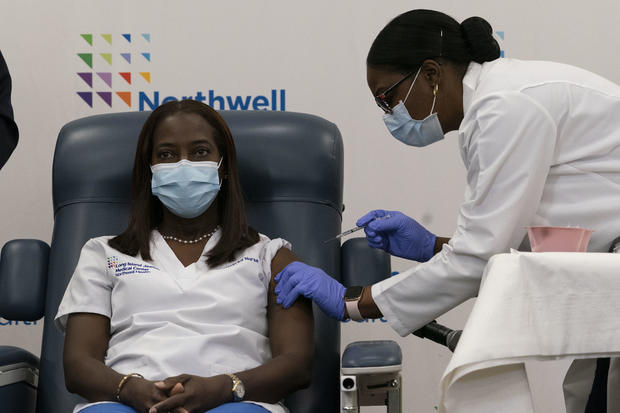More than 300,000 people have now died from the coronavirus in the United States, according to data from Johns Hopkins University. The milestone comes as the first Americans are receiving Pfizer’s newly authorized coronavirus vaccine, which the nation hopes will turn the tables in the fight against the virus.
The vaccine’s arrival comes at a time of crisis. The U.S. has set records for COVID-19 hospitalizations eight days in a row, and the number of patients requiring intensive care is up 80% from a month ago.
In California’s Los Angeles County, new COVID-19 cases are up 370% in just one month — and there are no ICU beds left in the state’s Central Valley. In New Jersey, which currently has the highest COVID-19 death rate in the nation, Governor Phil Murphy warned that the coming weeks “are going to be hell.”
Former Food and Drug Administration Commissioner Dr. Scott Gottlieb warned Sunday that coronavirus infections will likely peak in January, due in part to Americans ignoring warnings from health officials and traveling during the holiday season.
“The pressure is going to be on the health care system, and we need to keep the health care system from getting maxed out,” Gottlieb said in an interview with “Face the Nation.” “They’re not going to see peak-burden on hospital resources probably until mid-January, late January.”
Local leaders have implemented drastic new restrictions in recent weeks to curb the virus’ spread. New York City shut down indoor dining as of Monday, and Mayor Bill De Blasio warned that the city could face a full shutdown in the weeks ahead. Leaders in California, Philadelphia, Virginia and a number of other states have implemented curfews, closed indoor dining, and shuttered other non-essential businesses.
Since the FDA authorized Pfizer’s vaccine for emergency use on Friday night, the company has been racing to distribute nearly 3 million doses to more than 600 locations around the country. In New York, Governor Andrew Cuomo on Monday hosted a televised update that saw critical care nurse Sandra Lindsay receive one of the first doses of the vaccine.
Mark Lennihan/AP Photo/Bloomberg via Getty Images
“I believe this is the weapon that will end the war. This is the beginning of the last chapter of the book,” Cuomo said Monday.
In Louisville, Kentucky, nurse LaShawn Scott also received a dose. “I can feel relief now, I know we still have a long road ahead of us, but I can see that light at the end of the tunnel now,” Scott said.
FedEx and UPS, the companies responsible for distributing the vaccine, told CBS News they made all of Monday’s vaccine deliveries on or ahead of schedule. Pfizer told CBS News that all of Monday’s shipments were “delivered on-time and within acceptable temperature conditions,” adding that scheduled shipments for Tuesday and Wednesday “are already packed and in distribution.”
Pfizer will roll out 2.9 million doses of the vaccine this week, and another 2.9 million next week. In total, 20 million doses of the vaccine are expected to be delivered by the end of the year. Each person vaccinated will require two shots, three weeks apart.
As CBS News previously reported, Pfizer has pledged to deliver up to 100 million doses of the vaccine by the end of the first quarter of 2021. A second vaccine from Moderna is also seeking emergency authorization from the FDA and could start rolling out next week.
A bipartisan group of legislators on Monday unveiled a pair of coronavirus relief bills designed to help American workers and small businesses survive the remainder of the pandemic. A $748 billion bill is expected to include Paycheck Protection Program funding, unemployment insurance and more money for vaccine development and distribution. A $160 billion bill, which is expected to face more resistance in the Republican-controlled Senate, would provide state and local funding.
Mola Lenghi, Jonathan Vigliotti and Kris Van Cleave contributed reporting.
